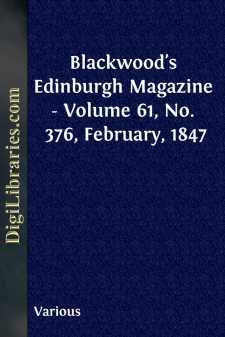Categories
- Antiques & Collectibles 13
- Architecture 36
- Art 48
- Bibles 22
- Biography & Autobiography 813
- Body, Mind & Spirit 142
- Business & Economics 28
- Children's Books 15
- Children's Fiction 12
- Computers 4
- Cooking 94
- Crafts & Hobbies 4
- Drama 346
- Education 46
- Family & Relationships 57
- Fiction 11828
- Games 19
- Gardening 17
- Health & Fitness 34
- History 1377
- House & Home 1
- Humor 147
- Juvenile Fiction 1873
- Juvenile Nonfiction 202
- Language Arts & Disciplines 88
- Law 16
- Literary Collections 686
- Literary Criticism 179
- Mathematics 13
- Medical 41
- Music 40
- Nature 179
- Non-Classifiable 1768
- Performing Arts 7
- Periodicals 1453
- Philosophy 64
- Photography 2
- Poetry 896
- Political Science 203
- Psychology 42
- Reference 154
- Religion 513
- Science 126
- Self-Help 84
- Social Science 81
- Sports & Recreation 34
- Study Aids 3
- Technology & Engineering 59
- Transportation 23
- Travel 463
- True Crime 29
Blackwood's Edinburgh Magazine - Volume 61, No. 376, February, 1847
by: Various
Description:
Excerpt
MEMOIR OF THE LATE JOHN WILLIAM SMITH, OF THE INNER TEMPLE, BARRISTER-AT-LAW.
BY SAMUEL WARREN, OF THE INNER TEMPLE, BARRISTER-AT-LAW.
But the fair guerdon when we hope to find,And think to burst out into sudden blaze,
Comes the blind Fury with the abhorred shears,
And slits the thin-spun life.
Milton.—Lycidas.
The name of John William Smith, barrister-at-law, of the Inner Temple, now appears, possibly for the first time, before nineteen-twentieths of the readers of Blackwood's Magazine. It is that, however, of a remarkable and eminent man, just cut off in his prime, before he had completed his thirty-seventh year: having as yet lain little more than a twelvemonth in his grave, to which he had been borne by a few of his sorrowful and admiring friends, on the 24th of December, 1845. Another eminent member of the English bar, Sir William Follett, belonging to the same Inn of Court, and also cut off in the prime of life, while glittering in the zenith of his celebrity and success, had been buried only five months previously. I endeavoured to give the readers of this Magazine, in January 1846, some account of the character of that distinguished person; and Mr. Smith, learning that I was engaged upon the task, with morbid anxiety repeatedly begged me to show him what I was writing, up to within a few weeks of his own decease: a request with which, for reasons which will become obvious to the reader of this sketch, I declined to comply. With Sir William Follett's name all the world is acquainted: yet I venture to think that the name of John William Smith has greater claims upon the attention of readers of biography. His character and career will, it is believed, be found permanently and intrinsically interesting,—at once affecting, inspiriting, and admonitory. He fell a martyr to intense study, just as that competent and severe body of judges, the English bench and bar, had recognised his eminent talents and acquirements, and the shining and substantial rewards of unremitting exertion were beginning to be showered upon him. He came to the bar almost totally unknown, and was destitute of any advantages of person, voice, or manner. His soul, however, was noble, his feelings were refined and exalted; and, when he departed from the scene of intense excitement and rivalry into which his lot had been cast, those who had enjoyed the best opportunities for forming a true judgment of him, knew not whether more to admire his moral excellence or his intellectual eminence, which shone the more brightly for the sensitive modesty which enshrouded them. Many have expressed surprise and regret that so interesting a character should fade from the public eye, without any attempt having been made by his friends to give a full account of his character and career. I was one of his very earliest friends; witnessed the whole of his professional career, shared his hopes and fears, and, with two or three others, attended upon him affectionately to the very last. During the year which has since elapsed, I have reflected much upon his character, and had many opportunities for ascertaining the respect with which his memory is cherished in the highest quarters. I shall endeavour, therefore, though with great misgivings as to my competency for the task, to present to the reader an impartial account of my gifted friend: no one else, with one exception, having, up to this time, undertaken the task.
John William Smith, the eldest of eight children, was of a highly respectable family: his father having died in 1835, Vice-treasurer and Paymaster-general of the Forces in Ireland. Both his parents were Irish—his mother having been a Miss Connor, the sister of a late Master in Chancery, in Ireland. They lived, however, in London, where the subject of this memoir was born, in Chapel Street, Belgrave Square, on the 23d January, 1809. From the earliest period at which note could be taken of their manifestation, he evinced the possession of superior mental endowments. No one is less disposed than the writer of this memoir, to set a high value upon precocious intellectual development....












